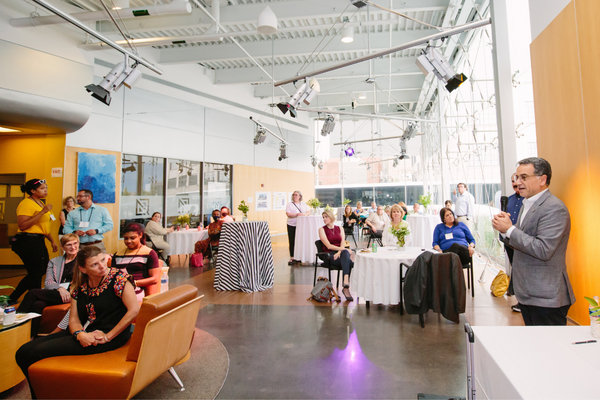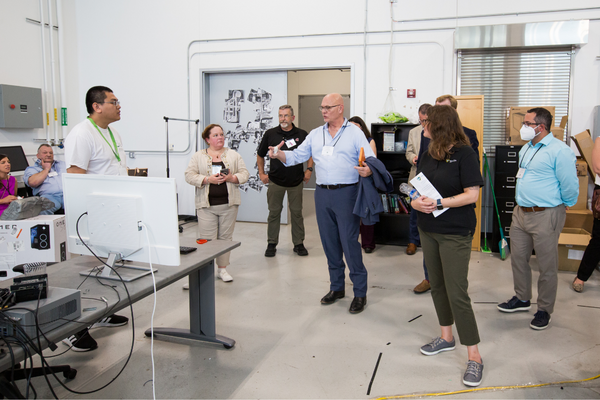Wayne State cohosts APLU meeting on inclusive community and economic engagement
This August, university leaders and senior staff from across North America convened at Wayne State University for a joint meeting of the Commission on Economic and Community Engagement (CECE) and Council on Governmental Affairs (CGA). Organized by the Association of Public and Land-grant Universities (APLU) and cohosted by Wayne State, Michigan State University, Michigan Technological University, Oakland University, and the University of Michigan, the meeting focused on “inclusive community and economic engagement: the path to social mobility.”
Wayne State is one 246 APLU member institutions and one of the first to be recognized by the APLU as an Innovation and Economic Prosperity University, a designation honoring higher education institutions that have demonstrated a commitment to economic engagement.

According to Vice President for Academic Student Affairs and Global Engagement Dr. Ahmad Ezzeddine, who also serves as a CECE executive committee member, Wayne State has been working for several years to bring the APLU to Detroit. “Wayne State is a leader in university-led community and economic engagement, and cohosting this meeting gave us the chance to showcase our work and our city,” said Ezzeddine.
Ezzeddine and Vice President for Government and Community Affairs Patrick Lindsey were instrumental in bringing the joint meeting of the CECE and CGA to Detroit.
During the meeting, WSU President M. Roy Wilson welcomed participants to campus and shared his perspective on community engagement and economic development alongside Ora Hirsch Pescovitz, president of Oakland University, and Kathleen Wilbur, senior vice president, government relations at Michigan State University. “Our economic impact is considerable,” noted Wilson, “and our commitment to our home city and state should be, too.”
Lindsey moderated a conversation with U.S. Rep. Brenda Lawrence (MI-14) who spoke about her career in public service and shared tips for how universities can best engage lawmakers in Washington, D.C.
Assistant Vice President for Economic Development Kelly Kozlowski and Director of Economic and Community Development Emily Thompson led a session on Wayne State Office of Economic Development’s 2022-27 economic impact strategy. Kozlowski and Thompson were joined by Ashley Williams Clark, vice president and director of the Center for Equity, Engagement and Research at Detroit Future City, a nonprofit think tank and advocacy organization whose recent report on “The State of Economic Equity in Detroit” helped inform Wayne State’s economic impact strategy. The goal of the session was to inspire conversation about how institutions of higher education define and measure success as drivers of economic opportunity and social mobility.
Another session featured Britany Affolter-Caine, executive director of the University Research Corridor (URC), a research consortium comprised of Wayne State, Michigan State and the University of Michigan. According to their latest economic impact report, the URC’s combined economic contribution to the state has grown by 60% over the last 15 years.

Meeting participants also toured the Wayne State innovation campus, which consists of the Integrative Biosciences Center, TechTown Detroit, and the Industry Innovation Center, and heard from Vice President for Economic Development Ned Staebler about the role Wayne State and TechTown played in metro Detroit’s Build Back Better Regional Challenge (BBBRC) application. Metro Detroit was recently selected out of 60 finalists nationwide to receive one of the largest BBBRC grants out of 21 funded projects. The $52.2 million grant will advance the state’s mobility and electrification leadership and build on Michigan’s economic momentum.
“We were excited to welcome this group of university leaders to Detroit and to show off our city and the incredible work Wayne State is doing to contribute to an increasingly vibrant and equitable Detroit and Michigan,” Staebler said.
The APLU is a research, policy and advocacy organization dedicated to strengthening and advancing the work of public universities in the United States, Canada and Mexico.